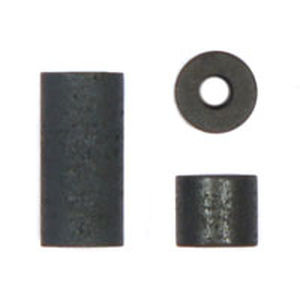Ferrite beads are used to prevent rf leakage from electronic equipment due to parasitic oszillations arising from spurious feedback and can also be used for suppression of
interference.
Chokes produced from these cores have applications in vhf radio and television receivers, ignition systems, electric motors and supply leads of electronic equipment.
A ferrite bead threaded on a lead produces little voltage drop at low frequencies (50 Hz, 400 Hz), but ist acts as an impedance at high frequencies (some MHz) due to the initial permeability and the losses of material. The losses generally increase with frequency in spite of a gradual loss of permeability. This decrease in permeability becomes noticeable
at frequencies many times higher than usual upper limit of application.
The increasing losses and decreasing permeability as a function of frequency cause a characteristic of impedance versus frequency without any peak or resonant point.
The impedance of the wire threaded through the bead is proportional to the length of the
bead or the number of beads used. Alternatively several turns of wire wound toriodally can produce a higher impedance.
The value of impedance of one ferrite bead max be calculated to about 20 Ω to 50 Ω in a
frequency range of 20 MHz to 300 MHz.


